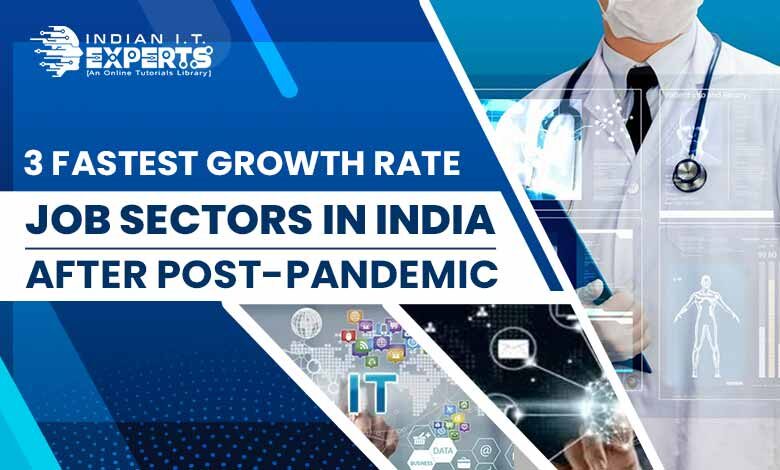3 Fastest Growth Rate Job Sectors in India after Post Pandemic (2022 Guide)

Are you searching for the best job after the pandemic? Here are the 3 fastest growth rate Job sectors in India after post pandemic. Many people left their jobs due to pandemics because of the recession in that sector. Thus you get the information about the sector where you are going to find the job.
I provided you with the complete information of the 3 fastest growth rate Job sectors in India after post pandemic, so please go through the topic carefully and choose the sector for the job as per your strength, experience, and interest.
Table of Contents
Here are the details of 3 Fastest Growth Rate Job Sectors in India after Post Pandemic
1. Healthcare:

The healthcare sector is related to work such as providing medical services, manufacturing medical equipment, medical insurance, and also facilitating the provision of healthcare to patients. During the pandemic period, India has made significant advancements in the way healthcare is delivered in the country.
Public healthcare focuses on delivering primary healthcare through community-level health programmes mainly focusing on reducing mortality rate and morbidity caused by various communicable and non-communicable diseases during the pandemic period.
Why the Healthcare sector?
- In terms of employment and revenue, it has been one of the largest sectors and is growing at a brisk pace.
- Healthcare in India is delivered mainly either by public or private providers both with the same vision.
- There are providers of basic health services are provided through sub-centres and primary health centres for every needy patient.
- Secondary and tertiary care is delivered at community health centres, district hospitals and medical colleges because of better-equipped establishments.
How India won Covid-19 Battle:
Despite initial hiccups, the healthcare system in India managed to withstand the pandemic. The steps are taken such as:
- While calling and picking phones calls by every citizen the message started regarding the updates and information about the pandemic.
- The various efforts in manufacturing of necessary medical equipment, disposables, drugs, Masks, etc.
- The most recent vaccine efforts made by India has placed us as a global leader among the developed and developing countries.
- India not only fulfilled the self-requirements but also rose to the occasion and supported other countries in this pandemic.
Check Also:
- How to Prepare for Telephonic Interview | Interview Tips
- Keep These 6 Things in Mind During a Job Interview
- Best Part-Time Jobs for College Students in Delhi
- How do You Get a Job in AI Without a Degree?
- Top 10 Highest-Paying Private Jobs in India
Job Growth Rate:
The healthcare sector companies that provide medical supplies and equipment is one of the highest paying private jobs in India. The salary package of the doctors depends on their specialization stream. The doctors also work for their clients after their jobs which helps them to earn more and increase their earnings.
Traditional specializations like Pharmacy, Dentistry, and Optometry also are high-paying healthcare channels.
Best Hospitals for highest paying are:
- Apollo
- Fortis
- Max
Above are the highest paying private organization in India.
The Average salary Packages:
- The average salary of a Health professional in India is 10 LPA.
- The average salary earned by a general physician in India is around Rs.7 LPA
- The salary earned by a General Surgeon is around 12 LPA.
Basic Requirement of Education, and Eligibility:
- The basic requirement of a health professional is a degree of Bachelor of Surgery and a Bachelor of Medicine (M.B.B.S) from a recognized Institute from Medical Council of India (MCI).
- In post-graduation, the aspirant can also select specialization of their interest like Orthopedics, Surgery etc.
Digital Growth in the Health sector
Since the pandemic, there has been a greater emphasis on making the healthcare sector digitally friendly. With the launch of national public health initiatives such as Ayushman Bharat and the National Digital Health Mission, India has taken a step toward digitalizing healthcare.
The only stumbling block is the difficulty in adapting technology for patients and doctors. Many people are still struggling to become acquainted with the technology. The COVID-19 had a significant negative impact on our economy, but it also created opportunities for positive transformations, such as the adoption of digital technologies in the healthcare sector.
Why maximum Job opportunities in Healthcare Sector?
Job Opportunities: The number of jobs in this sector will undoubtedly increase following the pandemic. Health insurance awareness has grown significantly and is expected to grow further in the future.
The number of people investing in insurance grows with each passing year, and the trend is expected to continue due to increased awareness. Foreign patients are drawn to India’s healthcare sector because of the availability of high-quality services at very low prices when compared to Western countries.
As a result, post-pandemic, medical tourism in India is expected to grow in the coming years. Online consultations and online medical platforms are becoming increasingly popular in today’s world. The Indian government will place a greater emphasis on increasing the use of technology in the country.
What is the best job post in Healthcare Sector?
Registered nurses:
A Registered Nurse, or RN, collaborates with other healthcare professionals to treat patients suffering from various injuries, illnesses, or disabilities. Their responsibilities include communicating with Doctors and other Registered Nurses about patient needs, administering IVs and medications to help their patients’ health, and monitoring patients’ vital signs using medical equipment.
Registered nurse’s responsibilities can vary depending on the work environment, but Registered nurses typically include the following:
- Observe and document the patient’s behaviour.
- Conduct physical exams and diagnostic tests.
- Gather the patient’s medical history.
- Provide treatment plan counselling and education to patients and their families.
- Dispense medication, change wound dressings, and provide care for other treatment options.
- Read and interpret patient information, making appropriate treatment decisions.
- Consult with supervisors and doctors to determine the best course of treatment for patients.
- Manage and direct nurses, nurse assistants, and nurse aides.
- Look into ways to improve healthcare processes and patient outcomes.
Essentially degrees to become a Registered Nurse are:
The first is a two-year Associate Degree, and the second is a four-year Bachelor of Science Degree. There used to be a three-year program called the Diploma of Nursing, but it has since been phased out.
Starting Salary
The starting salary of a Registered Nurse begins with 233,151 LPA, which includes bonuses and overtime pay as per extra hours.
Experienced salary:
- Registered Nurses can earn a total compensation of 249,994 LPA after 4 years of experience.
- Nurses in their mid-career with 5-9 years of experience can earn around 393,132 LPA.
- Experienced nurses with more than 15 years in the industry can earn 496,269 LPA.
The Covid-19 pandemic has exposed the country’s frail healthcare system. It has refocused attention on the health sector’s multiple challenges, including low investment and a shortage of doctors, paramedics, and hospitals. The pandemic has also highlighted the significance of paramedics and nurses in dealing with a medical emergency. As a result, there will be a high demand for registered nurses in India in the future.
Clinical laboratory technologists and technicians:
A clinical laboratory technologist performs a test to analyse body fluids, tissue, and other substances while a laboratory technician helps to collect samples to perform these functions. Hospitals employ a large number of clinical laboratory technologists and technicians. Others work in medical and diagnostic laboratories, as well as in doctors’ offices.
Essentially degrees to become Clinical laboratory technologists and technicians is:
A bachelor’s degree is typically required for clinical laboratory technologists. Technicians are typically required to have an associate’s degree or a postsecondary certificate. Licensed technologists and technicians are required in some states.
Starting Salary:
- In India, the average salary for a Medical Lab Technologist is 2.7 Lakhs per year (22.5k per month). Salary estimates are based on 391 salaries submitted by Medical Lab Technologists from various industries.
- The average lab technician salary is 295,422 per year or 151 per hour in India.
- Entry-level salaries begin at 210,000 per year,
- Experienced workers earn up to 1,537,200 per year.
Clinical technologists and technicians have been in high demand in recent years, particularly since March 2020. This demand is expected to rise further post covid-19 pandemic.
Epidemiologist:
Epidemiologists are public health professionals who study the patterns and causes of disease and injury. They work to reduce the risk and occurrence of negative health outcomes through research, community education, and health policy. When disease breaks out or other threats emerge, epidemiologists are on the scene to investigate, looking for the source of the disease, identifying those who are at risk, and determining how to control the spread. They can work in private or government offices, as well as laboratories.
Essentially degrees to become Epidemiologist:
To become an Epidemiologist, you can study courses such as B.Sc in Epidemiology, B.Sc or Bachelor of Public Health, or something similar. You can also pursue M.Sc. or Master’s degree in Public Health/Epidemiology, as well as a PhD in Epidemiology, as additional qualifications.
Starting Salary:
In India, the average salary for an epidemiologist is INR 5, 68,000 per year. The average monthly salary can reach INR 70,937. During this pandemic, epidemiologists are in high demand. The demand for epidemiologists will be extremely high post-pandemic.
Biotechnologist:
A biotechnologist is someone who uses biological processes to benefit industrial and other applications. In other words, they apply biology in a practical way, such as the production of antibodies or protein drugs. This pandemic has highlighted the significance of a Biotechnologist. The coronavirus pandemic is just getting started. Many epidemics, such as Covid-19, may occur in the future. As a result, the healthcare sector is receiving increased attention.
Every country in the world has increased its budget for the healthcare industry. This has created numerous job opportunities in the healthcare sector and will continue to do so in the future. Post pandemics we can see a huge demand in the field of biotechnologists.
Essentially degrees to become Biotechnologist:
An aspiring biotechnologist typically needs to earn a bachelor’s degree after graduating from high school. While an undergraduate degree in one of the life sciences or a related field of engineering can be used to pursue this career, the most direct path is to major in biotechnology itself.
Starting Salary:
In India, the average salary of a biotechnologist ranges from Rs. 2, 29,238 to Rs. 8, 28,746 per year, depending on experience.
Research associate and API expert in pharma:
The Clinical Research Associate will be involved in all stages of the clinical trial, including identifying an investigation site, setting up, initiating, monitoring, and closing the trial at the end or beginning. API stands for Active Pharmaceutical Ingredient, and an API expert is someone who creates this ingredient, which is a component of medicine that produces the desired effect.
Essentially degrees to become a Research associate and API expert in pharma:
To get an entry-level job in clinical research, you must have a bachelor’s degree in life sciences, nursing, biotechnology, or medical sciences, as well as a diploma or certification in clinical research from a reputable institute.
Because the majority of the API segment of pharmaceutical R&D is concerned with the synthesis, purification, and improvement of the Active Pharmaceutical Ingredient or the crude drug, a Master in organic chemistry or a Master in Pharmaceutical analysis is all that is required.
Starting Salary:
- In India, the average base salary for a Clinical Research Associate is Rs. 331,275 per year.
- API Developer salaries in India range from 2.6 Lakhs to 23.5 Lakhs per year, with an annual salary of 6.8 Lakhs as the national average.
As the pharmaceutical industry races to find a cure for Covid-19 to meet existing drug demand, India is the world’s largest supplier of generic medicines. As a result, the pharmaceutical industry is one of the few sectors still hiring during the Covid-19 outbreak. The most popular roles here are regulatory affairs and API expert. In addition, there is a high demand for people who work in clinical trials and product development.
Nutritionist/Dietician:
Due to the pandemic, it’s a positive sign among the people that Health and nutrition are gaining so much momentum, in social media. Now people are more conscious about what they are eating, about nutrients, etc. Hence, they always prefer consulting a nutritionist, and in this matter, a nutritionist can help with food management. Same as a dietician takes into account the patient’s health, lifestyle, age, potential allergies, etc. A dietician is also a better consultant to take advice regarding a balanced diet for better health.
Essentially degrees to become Nutritionist/Dietician:
To become a nutritionist one should either complete a post-graduate diploma in Nutrition and Dietetics or M.Sc. in Food and Nutrition followed by a six months internship after graduation.
Same as for a dietician you need a Bachelor’s and/or Masters’s/PG diploma degree in Dietetics to make your career in Dietician.
Starting Salary:
The national average salary for a Nutritionist in India is ₹22,682 per month.
This field will have huge demand post-pandemic. The average salary of a dietician in India is ₹25,102 per month.
Many dieticians have worked fabulously during the Covid-19 pandemic to serve the patients who were affected by this virus. They helped the patient to recover after a proper diet along with the medication.
2. IT Sector

Companies in the information technology (IT) sector produce software, hardware, or semiconductor equipment, as well as companies that provide internet or related services. Because the IT industry relies heavily on business from the United States and Europe, its fortunes are inextricably linked to the success of these global markets. As top clients from these regions reduce their IT spending in the aftermath of the COVID-19 outbreak, Indian IT companies should capitalise on their core value proposition and restructure their current services at reasonable price points.
This will help players thrive in the short term while also preparing them for the digital opportunities that will come knocking once the world has gone digital.
Best IT sector for high earnings
BPO: Business Process Outsourcing (BPO) is an abbreviation for Business Process Outsourcing. This is an excellent career path for recent graduates, whether they are technical or nontechnical. In this case, a company or a country delegated or hired people to complete non-core tasks by experts from other companies or countries. There are two types of BPO outsourcing.
- Back office outsourcing: In this case, the jobs are performed offsite and primarily involve dealing with customer service, data processing, accounting, finance, or other technical work. This is a non-voice-based BPO category.
- Front office outsourcing: In this case, the job entails providing front-office service. The nature of the job is to provide customer service and contact centre services and inquiries. This is a voice-based BPO category.
Qualifications required for a BPO position
- For a non-technical voice-based BPO category job, the basic educational qualification is Intermediate or Plus two.
- Excellent communication and knowledge skills, fluency and good accent, and a presentable voice are required.
- Computer knowledge, the ability to browse the internet, the ability to send and receive emails, a fast typing speed, and knowledge of Microsoft Office is required.
- Patience in answering phones and responding to inquiries, interpersonal skills, good listening skills, and a presentable voice is required.
- At the same time, if applying for a technical non-voice-based BPO job, some companies insist on a B. Tech or B. Com Degree as a minimum requirement because the candidate will be dealing with finance, accounting, purchase, sales, and human resources.
Why has outsourcing become so important?
- Due to its benefits, business processing outsourcing has become a smart alternative chosen by most countries and businesses.
- Outsourcing is less expensive and more cost-effective.
- A lack of technical staff or specific know-how has left no other option but to outsource.
BPO is a wise decision to outsource non-core tasks to experts. Today, BPOs are very popular in many countries for offshore, onshore, and nearshore projects. The national average salary for a bpo job in India is 17,216 rupees per month. Even as IT-BPO firms face pricing pressures, delays in technology investments, and project deferrals, the sector may see more outsourcing work in the near term. Following the pandemic, bpo workers will see new business opportunities.
Education/Teaching:
The education sector, also known as the education system, is a collection of institutions (ministries of education, local educational authorities, teacher training institutions, schools, universities, and so on) whose primary goal is to educate children and young people in educational settings.
Eligibility:
You need to do B.Ed. or a ¾ year Bachelor’s degree followed by a one-year Postgraduate Certificate in Education is required to pursue a career as a teacher.
Average salaries in the Education sector:
In India, the average teacher salary is 3, 90,000 rupees per year. Entry-level salaries begin at 2, 60,000 rupees per year. The pandemic has caused the closures of schools and colleges all over the world. As a result, there is a notable rise in e-learning, in which teaching is done remotely and on digital platforms. India’s edutech growth will accelerate post-pandemic.
Cyber security:
Presently many hackers are targeting more information security systems. Thus, the company needs information security analysts who can protect the company’s computer networks and systems. Information security analysts format and apply security systems to protect a company’s computer networks from cyber-attacks and to maintain security standards. After 12th class in a non-medical stream, students must pursue Diploma, BE, or B.Tech courses in Cyber Security, Computer Sciences, or Information Technology trades such as:
- A Bachelor’s degree of Technology in Cyber Security and Forensics to get into a cyber security career.
- Cyber Security Diploma
- The letter B.E. (Information Technology)
- B.Tech. (Information Science & Engineering) (Information Science & Engineering)
- Bachelor of Technology (Information Technology).
Aspiring candidates may be required to take Entrance Exams such as JEE to gain admission to these courses at some of India’s Top Engineering Colleges.
Candidates with a Bachelor’s degree can seek employment as a Cyber Security Expert in a variety of organizations or pursue Master’s degree courses in a related field, such as a master’s degree in Information Sciences. There are numerous engineering colleges and IITs that offer postgraduate programs.
Master’s Degree programs include:
- Post Graduate Diploma in Cyber Security
- M.Technology (Cyber Security)
- M.E/M.Tech. (Information Security)
- M.E. (Information Technology)
- M.B.A. (Information Security Management) (Information Security Management)
Average salary:
The average monthly salary for a Cyber Security Expert ranges between Rs.40, 000 and Rs.50, 000. Security Risk Management and IT Security and Infrastructure are the highest paying skills associated with this job. Post-pandemic, cyber security jobs will be more important because they are critical for infrastructure viability.
Cloud security:
Cloud security, also known as cloud computing security, is a collection of policies, controls, procedures, and technologies that work in tandem to safeguard cloud-based systems, data, and infrastructure. The goals of cyber security, of which cloud security is a subset, are the same.
Eligibility
Engineering, computer science, programming, and information security degrees are frequently a good fit for this role. Employers typically seek candidates with 3 to 5 years of experience in information security.
Average salary:
In India, the average cloud security salary is 1,600,000 rupees per year. Entry-level salaries begin at 1,337,500 rupees per year, with most experienced workers earning up to 2,500,000 rupees per year. Customer demand for cloud-based services has increased as a result of Covid 19. As a result, the demand for Cloud security experts will be extremely high following the pandemic.
AI specialist:
Artificial intelligence (AI) is the ability of a computer or a computer-controlled robot to perform tasks that are normally performed by humans because they require human intelligence and discernment. AI technology is significant because it allows the software to perform human capabilities such as:
- Understanding, and reasoning,
- Planning, and communication,
- Perception more effectively, efficiently, and at a lower cost.
Some of the specific applications of AI are:
- Expert systems
- Natural language processing
- Speech recognition
- Machine vision
Eligibility
A strong background in programming, systems analysis, and/or fluency in several computer languages is required for a career in Artificial Intelligence. A bachelor’s degree in mathematics, data science, statistics, or computer science can qualify you for entry-level jobs in the field of artificial intelligence.
Average salary:
The average annual salary of an entry-level AI engineer in India is around 8 lakhs, which is significantly higher than the average salary of any other engineering graduate. The salary of an AI engineer at a high level can reach 50 lakhs.
The COVID-19 crisis has caused significant uncertainty in the job market, resulting in one of the largest and hopefully temporary unemployment spikes ever seen in the modern economy. One thing is certain: artificial intelligence and digitalization are fueling the growth of new jobs. The recent crisis, which has compelled nearly every company to invest in digital transformation and virtual workspaces, has only increased the demand for AI skills. So the demand for AI experts is going to be huge post-pandemic.
SEO content writer:
An SEO content writer understands search engine optimization and knows how to write content that is informative, compelling, and relevant, as well as content that legitimately improves your search engine rankings. The primary distinction between an SEO content writer and a regular content writer is that the former understands how to create content that is not spammy to improve your website’s ranking.
Eligibility:
A degree in literature, journalism, or mass communication is preferred, while a master’s degree in a specialised field may be required for technical and research writing (for example, life sciences, physics, engineering, psychology, etc.).
Average salary:
In India, the national average salary for an SEO Content Writer is Rs. 18,856. With the onset of the Covid 19 pandemic, many people are shifting to online learning as opposed to traditional modes of education, creating a high demand for SEO content writers.
Developer:
A developer is someone who designs and develops software and applications. He or she is in charge of writing, debugging, and executing a software application’s source code. A software developer may also be referred to as a computer programmer, a programmer, a software coder, or a software engineer.
Eligibility:
To work as a developer in India, you must have a B. Tech in Computer Science or an MCA. You should be able to solve complex problems and think analytically.
Average salary:
A web developer’s salary in India for a fresher is approximately ₹ 1, 25,000 per year, while an experienced developer’s salary is approximately ₹ 8, 90,000 per year. With less than a year of experience, an entry-level system software developer can earn around rupees 4, 60,000 per year. Early-career system software developers with 1 to 4 years of experience can expect to earn around rupees 5, 31,792 per year.
The continued reliance on technology solutions across organisations, as well as the expansion of work-from-home structures, as well as businesses ramping up their technological infrastructures to scale up businesses and ensure smooth operations, has resulted in a surge in the number of job postings for tech jobs. As a result, there will be a high demand for developers following the pandemic.
Graphic designer:
Graphic Designing serves to convey your ideas in an Effective, Attractive and Beautiful way. Graphic Designing Plays an Enormous Role in Marketing the Products because everyone likes to see the Visual Content. Presentation and Perception can make or break any business, so, it’s important to present yourself in the best possible way & elucidate your skills to gain everyone’s trust by investing in Quality & Responsive Graphic Design.
About PDGD Course in Computer
| Course Name | Duration | Eligibility | Online Fee | Offline Fee |
| PDGD | 6 Month | 12th | 11500 | 28500 |
Average salary:
The average salary of a Graphic Designer in India is between 2.5 lakh to 3 lakh.
3. E-Commerce:

E-commerce websites allow consumers and buyers to buy and sell goods and services without the boundaries of time and distance. In simple words, if we try to understand the E-commerce business, then we will find that the business of selling and buying goods and services through the Internet is called an E-commerce business.
E-commerce websites played an important role at the time of lockdown and now maximum big brands started their E-commerce websites to sell their products to customers at the doorstep. Amazon, Flipkart, Shopify, Myntra, eBay, Quikr, and Olx are examples of e-commerce websites.
There are three types of e-commerce:
- Business-to-business (websites like Shopify)
- Business-to-consumer (websites like Amazon)
- Consumer-to-consumer (websites like eBay)
While progressive e-commerce growth could be seen long before Covid-19, it was the virus’s rapid spread that radically altered consumer behaviour and forced businesses to accelerate digital transformation. People stayed at home due to a national lockdown and apprehension about contamination. Non-essential stores were closed, and those that remained open had to reorganize quickly. With limited access to brick-and-mortar stores, consumers quickly shifted to e-commerce.
Job opportunities with E-commerce
Entry-level jobs:
Product lister, marketing associate, delivery driver, E-Commerce associate, sales representative, digital marketing account associate, marketing coordinator, and digital marketing coordinator are some entry-level E-Commerce jobs.
Customer service representative:
Customer service representatives are members of your service team who interact with customers. Their job is to provide product/service information, as well as receive and respond to client requests, questions, and complaints via phone, email, live chat, social media, or in-person. An e-commerce customer service representative assists customers by providing exceptional customer service from the time an order is placed until it is fulfilled.
Eligibility:
A high school diploma or a bachelor’s degree is typically required for customer service representatives. A high school education equips customer service professionals with the fundamental communication and interpersonal skills required to work in this field.
Average salary:
In India, the national average salary for a Customer Service Representative E-Commerce is Rs. 46,166 per month. With the majority of things moving online, there will be a high demand for e-commerce customer service representatives following the pandemic.
Marketing specialist:
Marketing specialists are in charge of tasks such as brainstorming marketing campaign ideas, developing brand messages to increase brand awareness, researching and analysing data, and developing sales presentations. Marketing trends, competition, new products, and pricing are all areas of study. Ecommerce Marketing Specialists are typically in charge of managing the development and maintenance of online stores, as well as developing new marketing strategies based on business analytics.
Eligibility:
A bachelor’s degree in marketing or a related field, as well as working knowledge of retail business and e-commerce best, practices, are required to become an e-commerce specialist.
Average salary:
In India, the national average salary for an Ecommerce Marketing Manager is 9, 06,734 rupees per year. The demand will be enormous even after the pandemic.
Administrative assistant:
Administrative assistants perform routine clerical and organizational tasks. They organize files, prepare documents, set up appointments, and assist other employees. An E-Commerce administrative assistant in a company performs day-to-day functions while keeping accurate records.
The following skills and experience are required for this E-Commerce Assistant position:
- 1+ years of experience in website maintenance and reporting from a similar background.
- Content, product, and inventory management experience.
- SEO experience and knowledge of non-technical SEO best practices.
- Knowledge of the Shopify, Amazon, and eBay platforms.
- Proven Copywrite and editing abilities.
- Knowledge of Google Analytics for project management and reporting.
- Numerical and intermediate Excel skills.
- Understanding of CSS Media Queries.
- A proactive personality that is self-assured and pays close attention to detail.
- Ability to work independently as well as part of a team.
- Appreciates working in a fast-paced, ever-changing environment.
Average salary:
In India, the national average salary for an E-Commerce Assistant is Rs. 15,869 per month. This job will be in high demand after the pandemic.
Business analyst:
Business analysts analyse past and current business data with the primary goal of improving organisational decision-making processes. They assess data acquisition, storage, and initial analysis before employing data science methods to assess effectiveness. Online retail performance for websites and e-commerce stores is investigated, dissected, and interpreted by e-commerce business analysts. They are highly skilled data analysts who identify opportunities for growth in online sales and marketing.
Eligibility:
A bachelor’s degree in business management, marketing, or data science is required to work as a business analyst in a company.
Average salary:
An e-commerce business analyst earns an annual salary of Rs. 18 lakhs on a national scale. This job will be in high demand following the pandemic.
Supply chain manager:
As a supply chain manager, you’ll be in charge of overseeing and managing every stage of the manufacturing process, from raw material procurement to final product delivery. You’ll make sure the right amount of product is made at the right time, as well as coordinate product storage. E-commerce supply chain management entails managing the flow of information, resources, and funds among the various entities and stages of the E-commerce supply chain, from raw material supply to finished product delivery to the buyer.
Eligibility:
To become a supply chain manager, you must have a bachelor’s degree in Supply Chain Management or Business Administration. A master’s degree in supply chain management may also help you advance professionally.
Average salary:
The national average salary for a Supply-Chain-Manager is rupees 12, 47,850 per year in India. This job will be in high demand even after the pandemic.
Digital operations manager:
To ensure the best digital experiences, the Digital Operations Manager is responsible for the stability and availability of all of our digital platforms (including the management of our partners and vendors). Digital operations are a new type of business operation. An Ecommerce Operations Manager oversees an e-commerce company’s logistics operations and manages, improves, and optimises various stages of the e-commerce supply chain.
Eligibility:
A bachelor’s degree in business, information technology, marketing, or a related field is required to become an e-commerce manager. Because you will be supervising department staff and projects, prior management experience is required.
Average salary:
In India, the national average salary for an Ecommerce Operations Manager is Rs. 31,429 per month. This profession will also see a significant increase following the pandemic.
Digital marketing manager:
Digital marketing managers plan and manage marketing campaigns that promote a company’s brand, products, and services. Campaign planning, metric analysis, and trend identification are among their responsibilities. They typically have prior experience in art direction as well as social media. Ecommerce marketing managers are in charge of developing the strategies that enable online transactions. They are in charge of organizing and developing website marketing plans, as well as carrying them out while training and leading a team of marketing executives.
Eligibility
A bachelor’s degree in a related field, such as marketing, digital media, communication, website/graphic design, English, or liberal arts, is typically required for digital marketing managers. While most of these professionals manage digital content, some may also direct and develop team members.
Average salary:
A digital marketing manager’s salary starts at 6.2LPA and can rise to 18LPA with experience. This job will be in high demand after the pandemic.
E-commerce SEO:
E-commerce SEO is the process of increasing your online store’s visibility in search engine results pages (SERPs). When people search for the products you sell, you want to rank as high as possible to get more traffic. Paid search can bring you traffic, but SEO is much less expensive. Professional course in Digital marketing can forward your career in the field of SEO executive
Average salary:
The average salary of an e-commerce SEO in India is between rupees 1.2 lakh to 3 lakh in starting and reaching the high package after the experience.
How to find a job?
All of the jobs listed above are the highest-paying private jobs in India since the pandemic.
(Website):
- Naukri
- Monster
- Shine
- IndeedLinkedIn
- Glassdoor
are some well-known job-search websites in India.
Conclusion:
Please select the job sector as per your strength, and interest as then only you will get more growth in the future. Above is the best sector for the highest earnings. Earning is necessary to fulfil one’s needs on daily basis.
Due to the Covid-19 pandemic, there are sectors facing recession and due to recession, there is a lack of job opportunities for people. Thus, you can search for a job in the above sector to get more earnings. And above sector will not only provide you with good earnings but also these will grow in the future.
FAQs:
-
Which are the best sectors to invest in India post-Covid-19?
Healthcare
IT
Education
Agriculture -
Which sectors will be in high demand in the post-Covid Era?
Healthcare
IT
Education
Agriculture
Digital sector
E-education -
Which sector will grow in future in India?
Healthcare
IT
Education
Agriculture
Digital sector
E-education -
Which sector is expected to grow in the next 10 years in India?
Healthcare and IT sectors are expected to grow in the next 10 years in India
-
Which are the fastest growing sector in India 2025?
Healthcare
IT
Education
Digital -
Which sector is developing very fast in India in recent years?
Healthcare, IT, and Online Education sectors are developing very fast in India in recent years.




